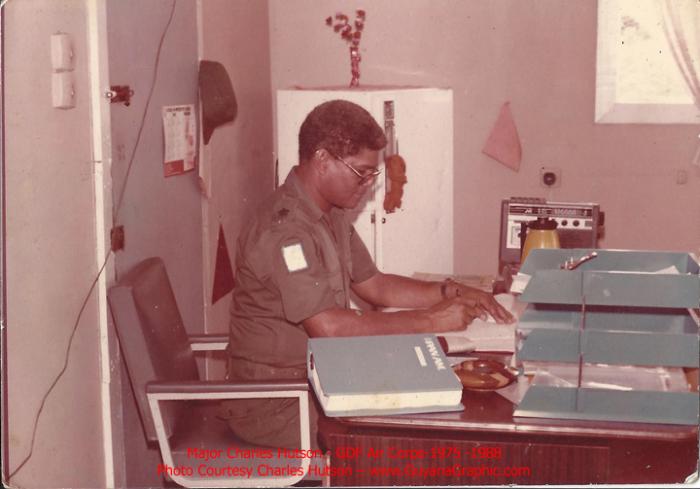
An excerpt from Cy Grant’s website – Born in British Guiana (now Guyana), South America, Cy Grant (1919-2010) lived an extraordinary life.
He served as a Flight Lieutenant Navigator in the Royal Air Force during the Second World War, was shot down and spent two years as a prisoner of war in Germany. After the war he qualified as a Barrister at Law, but went on to be an actor on stage and in film, as well as a singer in concert and cabaret. His was the first black face to be regularly seen on British television, singing the news on the BBC TONIGHT programme.
He had his own series on Radio and TV and his acting career is on record in BLACKSTAGE, an Oral History Project kept at the Theatre Museum. He is the author of RING OF STEEL, pan sound and symbol (Macmillan 1999), and other books. He was the Chairman/co-founder of DRUM, the London-based Black arts centre in the 1970’s and Director of CONCORD Multicultural Festivals in the 1980’s. He was an Honorary Fellow of the University of Surrey, Roehampton and a member of The Scientific & Medical Network. See more at https://cygrant.com/about-cy-grant
The Telegraph, February 15, 2010 – Cy Grant, who died on February 13 aged 90, was the first black person to appear regularly on British television; during the war he was also one of the few West Indian volunteers to be commissioned in the RAF and spent two years as a German prisoner-of-war.
Although presented as an “unthreatening” black middle-class face amid the donnish coterie of white reporters on Tonight, the popular early evening topical magazine programme in the late 1950s, Grant later became a radical figure in black politics.

Launched in 1957, Tonight was characterised by what the commentator Christopher Booker considered “its earnest lack of respect and ‘satirical’ interludes”. Part of the programme’s edge derived from Grant’s nightly topical calypso, with words written by the journalist Bernard Levin offering a cutting take on the stories and issues of the day.
Grant sometimes struggled with Levin’s lyrics, as the Wagner-loving wordsmith had a tin ear for the lilting rhythms of the calypso, but there seems to have been no question of a West Indian being allowed to write his own verses.
Even working against the clock, Levin would often turn in highly ingenious and amusing lyrics. But at the end of each verse, Grant’s refrain was always the same: “We bring you the news that you ought to know/In Tonight’s topical calypso”.
A handsome, strapping figure of 6ft 2in, Grant came to relish his role as the programme’s resident black troubadour – “Television was like facing God!” he declared – but he left within three years because he felt he was being typecast. The show, introduced by Cliff Michelmore, continued until 1965, attracting at its peak some five million viewers.
The great-grandson of a slave, Cyril Ewart Lionel Grant was born on November 8, 1919 into an upper middle-class family in Beterverwagting in Demerara, British Guiana (now Guyana). He was one of seven children of a Moravian minister and a music teacher. His father nurtured in him a love of books, and the importance of black figures in the development of western civilisation, impressing upon him that both Alexander Pushkin and Alexandre Dumas were black.
When Cy was 11 the family moved to New Amsterdam, 50 miles down the coast. On leaving high school, he took a clerk’s job in the office of the stipendiary magistrate.
In 1941 he joined the RAF, which had started to admit “men of colour” following the huge losses sustained during the Battle of Britain the previous year. Grant was one of some 400 young men from the Caribbean recruited as aircrew, and after navigator training in England was commissioned as a flight lieutenant.
Assigned to No 103 Squadron of Bomber Command based at Elsham Wolds, Lincolnshire, he had flown three missions to the Ruhr valley as a navigator in Lancasters when, in June 1943, while returning from a raid, his aircraft was attacked over Holland.
In 2008 Grant told the Telegraph: “We had successfully bombed Gelsenkirchen on Friday June 25 when we came under attack as we flew home. The tail gunner, Pilot Officer Joe Addison, shouted over the intercom that a German fighter was closing in from underneath us. The German fired a long volley and a jet of tracer spat out towards us.”
The Lancaster pilot put his aircraft into a dive; the enemy fighter disappeared; and it seemed as if Grant and his comrades had escaped. Then they realised that the outer starboard engine was on fire. Again the pilot dived, trying to extinguish the flames; but the fire spread, and one of the wheels fell off.
“By the time we reached the coast,” Grant recalled, “we were a flaming comet over the Dutch sky. Both wings were on fire now and I gave the shortest course to the English coast. Unfortunately we were flying into a headwind of about 80 miles an hour at 20,000ft.”
In the end the crew was forced to turn back to Holland and bail out. “We had been instructed in the use of parachutes but never had to practise leaving an aeroplane by one. When I went forward I found that the bomb aimer and engineer, who should have left in that order, were struggling to get through the hatch-door situated below the bomb aimer’s cushion in the nose.
“Al [Alton Langille, the pilot] left his controls and came after me. The four of us were soon piled one on top the other, tossed from side to side in the cramped space of the nose of the plane… when suddenly, with a deafening blast, which lit up everything, our aircraft blew up and disintegrated.”
Grant found himself descending by his parachute. He landed in a field and hid for most of the day in a cornfield: “I was aware that the Germans were all about looking for survivors of the crash. My heart was pounding. We had been told to try to escape south and hopefully get to Spain – an improbable task for a black man in Europe without attracting attention. I realised that my only hope was to seek help from the Dutch. In the early evening I managed to attract the attention of a farmer who beckoned me to jump the ditch separating us. He thrust a spade into my hand so it would appear from a distance that I was a farm hand. He then took me to the farm, where his wife tended the small cut on my head and gave me a hot meal.”
Grant was betrayed by the local Dutch policeman. He was transported to Stalag Luft III (later the scene of the Great Escape) before being sent to another compound a few kilometres away and eventually to Lukenwalde, some 50km south of Berlin. His picture was printed in a German newspaper with the caption “a member of the RAF of indeterminate race” which he later used as the title of a war memoir. He was liberated by advancing Russian troops in 1945.
After the war Grant retrained as a barrister and read for the Bar at Middle Temple, qualifying in 1950, but apparently found work hard to come by owing to his colour.
Instead he turned to acting in order to make a living; he hoped that a stage career would help improve his diction in anticipation of entering Chambers. A successful audition for Laurence Olivier and his Festival of Britain company led to appearances in London’s West End and at the Zeigfeld Theatre in New York. Realising that there were few roles for black actors, Grant decided to diversify by turning to music, using the skills he had learned as a youngster in the West Indies, where he had sung and played the guitar.
Revue and cabaret dates followed, as well as appearances on the BBC’s Third Programme and the Overseas Service, and culminated in his own ITV television series, For Members Only. In 1956 he co-starred in a BBC Television drama about Caribbean immigrants, Man from the Sun, and the following year appeared in a war film, Sea Wife, alongside Richard Burton and Joan Collins.
His subsequent appearances on Tonight made him a household name, and after he left the show his stage and film career continued to flourish. He provided the voice-over for Lieutenant Green, the black defender of planet Earth in the 1960s ITV marionette series Captain Scarlet and the Mysterons, and in 1965 he played Othello at the Phoenix Theatre, Leicester, a role for which at the time white actors habitually “blacked up”.
In 1972 he returned briefly to the Bar, but after six months in the Middle Temple he decided he lacked the necessary passion for the law and turned to his background in the arts as a means of fighting racial discrimination.
“I moved from this smiling, nice, friendly character to someone who, by 1974, was a very angry black man,” he explained. Grant rounded on Cliff Michelmore, the Tonight presenter, saying he had always had the feeling that Michelmore had patronised him as “a friendly little performing animal”.
In the same year Grant founded Drum, Britain’s first black arts centre, which provided a showcase for black acting talent. During the 1980s he was director of the Concord multicultural festivals which sought to foster improved race relations in an increasingly diverse society. In 1997 he was awarded an honorary fellowship by Roehampton University.
During his wartime captivity, Grant began making notes for a memoir, which was published 60 years later as Blackness and the Dreaming Soul(2007). As a West Indian who had lived in Britain for many years, Grant wrote from an unusual perspective: that of an insider perceived as a perpetual outsider.
In 2008 he helped to set up an online archive to trace and commemorate Caribbean aircrew from the Second World War; and to the end of his life he was a firm supporter of the Bomber Command Memorial Appeal which still seeks to raise a monument to aircrew in London.
Cy Grant is survived by his wife, Dorith, and their four children.







